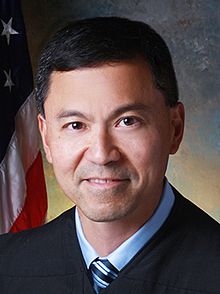United States judges block third version of President Trump's travel ban
Saturday, October 21, 2017
On Tuesday and Wednesday, United States District Judges in two states issued rulings barring enforcement of part or all of the latest version of President Donald Trump's executive order forbidding people from specific countries from entering the U.S.
On Tuesday, in Hawaii, District Judge Derrick Watson issued a temporary block on enforcement. On Wednesday, in Maryland, District Judge Theodore D. Chuang blocked one of its stipulations on the grounds that it was an "inextricable re-animation of the twice-enjoined Muslim ban." The order was to have gone into effect Wednesday night and would have affected people from Iran, Libya, North Korea, Somalia, Yemen, Syria, Chad, and some Venezuelans.

Image: United States District Court.
Watson, who previously ruled on another version of the order, ruled that the current ban "plainly discriminates based on nationality," "lacks sufficient findings that the entry of more than 150 million nationals from six specified countries would be 'detrimental to the interests of the United States'" and "suffers from precisely the same maladies as its predecessor."
Chuang blocked the order's measure pertaining to anyone with a bona fide relationship to someone in the United States.
White House press secretary Sarah Huckabee Sanders told the press, "The Department of Justice will vigorously defend the president's lawful action[...] These restrictions are vital to ensuring that foreign nations comply with the minimum security standards required for the integrity of our immigration system and the security of our nation."
"This cruel and bigoted ban remains as senseless as ever," Naureen Shah of Amnesty International said in a statement. "President Trump cannot continue to demonize people based on where they come from or how they worship. The Trump administration must end this legal battle and abandon the Muslim ban."
Then-candidate Trump promised his supporters "a total and complete shutdown of Muslims entering the United States" when running for office, and the previous versions of the travel ban were heavily criticized as targeting Muslims. Those versions named only Muslim-majority countries, like Iran. North Korea and Venezuela, which are not Muslim-majority countries, have since been named as well.
According to U.S. officials, Chad, which was not covered under any of the previous versions of the travel ban, was added to the list because of a technicality: It ran out of passport paper and couldn't provide the passport samples needed to complete the paperwork.
The United States Supreme Court may rule on the constitutionality of the travel ban eventually. A hearing on a previous incarnation of the ban, scheduled for October 10, was canceled after the Trump Administration announced the new version.
Related news
- "Third Trump travel ban takes effect" — Wikinews, July 2, 2017
- "U.S. judge blocks second Trump travel ban" — Wikinews, March 16, 2017
- "Travel ban 2.0 exempts Iraqis, U.S. permanent residents" — Wikinews, March 9, 2017
- "Travel to U.S. resumes after federal judge blocks executive order" — Wikinews, February 6, 2017
- "U.S. federal judge halts Trump's ban on refugees, people from Muslim countries entering U.S." — Wikinews, January 29, 2017
Sources
- Sabrina Siddiqui. "Hawaii judge blocks latest Trump travel ban with hours to spare" — The Guardian, October 18, 2017
- Associated Press. "Travel ban: Chad added because it ran out of passport paper, US officials say" — The Guardian, October 18, 2017
- "Trump travel ban: Third time is still no charm" — Baltimore Sun, October 18, 2017
- "Hawaii judge Derrick Watson blocks Trump travel order" — Al Jazeera, October 17, 2017



